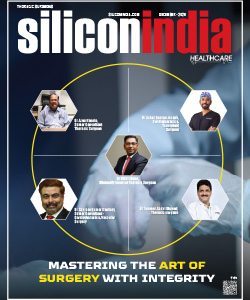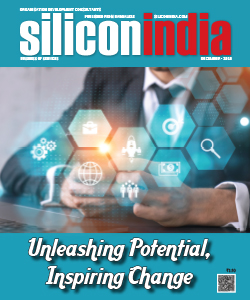Why is SaaS Model Gaining Widespread Adoption in India Lately?

Having completed his Executive Program in Business Finance from IIM Ahmedabad, Vasudeva boasts an illustrious three decades long career in the sales field across various capacities. He joined Zendesk in 2021, prior to which he has been associated with multinational corporates such as Salesforce, Oracle, SAP, Quest Software, Experian India, and TCS, to name a few. Siliconindia recently had the opportunity to interact with Vasudeva Rao Munnaluri, RVP Sales - India & SAARC, Zendesk, wherein he shared his insights on various aspects related to the SaaS market in India in recent times. Below are the key excerpts from the exclusive interview
Share your thoughts on the current SaaS market in India.
The pandemic accelerated the growth of SaaS businesses in India, with the SaaS market projected to reach $50 billion of annual recurring revenue (ARR) by 2030, nearly quadrupling its current size. A recent study by Bessemer Venture Partners indicated that in 2022 alone, investors funneled almost $6 billion into Indian SaaS companies - nearly 3.5x more than 2020. However, in 2023, SaaS market in India is witnessing a slowdown due to geopolitical conflicts and interest rate hikes owing to the inflation, thus making investors to be extra cautious about which software businesses to back.
Competing in a market as saturated as India’s is challenging and puts more pressure on SaaS companies to innovate, retain customers and acquire new ones. We expect more SaaS companies will focus on streamlining operations, optimizing costs and driving innovation by integrating emerging technologies like generative AI into their product offerings to help businesses tackle a myriad of issues. For instance, we see companies in the business of CX integrate generative AI into their product offerings to achieve a competitive edge. The most resilient businesses adapt in the face of adversity and we are seeing SaaS companies in India do the same.
Throw some light on the impact of modern day technologies on the SaaS space.
While the SaaS landscape in India is ripe with disruption, one area that has caught my interest is DeepTech. A recent study by EY and NASSCOM revealed 99 percent of Indian B2B SaaS companies have embraced DeepTech innovations as a strategic approach to address their clients’ needs. With customers increasingly expecting frictionless, intelligent and connected experiences across both online and offline mediums, AI holds significant promise in solving these demands. Also, more companies are leaning on AI to digitally transform their businesses, regardless of their size, and we’re seeing many breakthroughs in generative AI powered by large language models (LLMs) that are creating new use cases for businesses across industries. We expect Indian SaaS companies to focus on deep reasoning and creativity, which is crucial to CX and also effective in other industries.
What are a few key aspects an organization must consider while choosing a SaaS provider?
The competitive startup landscape in India offers businesses a myriad of choices in SaaS products and solutions. As businesses understand the importance of these platforms, there are a few key aspects to consider as well. Firstly, you must check if the technology is easy to implement, use and maintain. While you want a solution that can be deployed quickly to start delivering value, you must ensure that it doesn’t impede your employees in doing their work. Secondly, check if the technology is accurate and trustworthy for its intended purpose. For example, if a company is looking for an AI tool to level-up their customer service, they should look for SaaS solutions that are built on large CX-specific data sets, so they can trust that the AI is trained and able to accurately handle every possible customer support scenario. Finally, check if it is secure, transparent, and yet able to integrate seamlessly – one where data is safely stored and transmitted with advanced encryption, personal information is redacted, and data access records are detailed – and yet plays nice with your existing tech stack to avoid creating data silos.
Briefly explain how the SaaS model has been beneficial to startups in their innovation and R&D efforts.
SaaS model results in having more cash flow and less capital tied down in on-premise related costs, allowing more funds to be pumped into R&D. The recurring revenue common in the SaaS model also provides startups with much needed stability to innovate. However, the biggest benefit of being a SaaS company is the fast learn-and-adapt cycles they typically adopt. In fiercely competitive market, having fast test-and-learn cycles enables them to quickly identify the most pressing challenges & inefficiencies, solve them and improve with each iteration. Also, instead of chasing features and making more products for the sake of it, SaaS companies tend to focus on simplifying things and making them more accessible. Having that mindset and approach to innovation is a big reason why the SaaS industry continues to see growth every year.
What does the future hold for SaaS market in the days to come?
In the future, more SaaS businesses in the CX space will innovate to a level where AI can handle much more advanced, complex new problems across the entire customer journey. We expect AI to extend to the proactive and preventative support interactions, where it will eventually become the first point of contact in every customer service engagement. As more companies adopt cloud-based solutions, the SaaS market will undoubtedly continue to grow. Companies that embrace promising trends and emerging technologies will be better positioned for long term growth. We’re already seeing the significant impact AI has had on the SaaS market, and opportunities for more innovations are still emerging. What will likely determine their success is how customer-centric they are. Those who stay focused on the customer’s needs, pain points and feedback will reap the rewards.
Read More News :
The Post-Covid Skill Development Scenario in India
Identity Management - A Brief Overview from an Indian Context

.jpg)


.jpg)
.jpg)